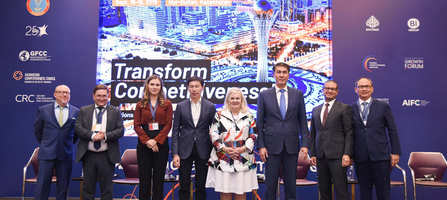
News
Serik Zhumangarin: Competition in Kazakhstan is declared to be a “national idea”
27 April 2021

Kapital news outlet
sources
The Chairman of the Agency for the Protection and Promotion of Competition of the Republic of Kazakhstan spoke about the National Project for the Development of Competition, existing barriers on markets and their elimination.
Head of State Kassym-Jomart Tokayev has repeatedly said that competition policy is of paramount importance and it is necessary to create truly equal opportunities for every entrepreneur. “Anti-competitive manifestations persist everywhere: coal market, electricity, oil products, communications, pharmaceuticals, airport services, housing and communal services, logistics, the list goes on,” he said on September 1, 2020, and at the same time ordered the creation of the Agency for the Protection and Development of Competition of the Republic of Kazakhstan. Later, January 2021, at an enlarged meeting of the government, the president once again focused on promotion of competition, talking about reconfiguring systemic policies. “I want to complete this block of instructions with one of the most pressing issues, which should become a priority in the activities of the entire state apparatus. It is the promotion of competition. Today, the country's economy suffers not only from the excessive state presence, but also from the non-competitive actions of private monopolies. Sometimes these are single operators created by the state, sometimes they are just private monopolies,” he said. Serik Zhumangarin, Chairman of the Agency, spoke about the measures taken by the Agency for the Protection and Development of Competition of the Republic of Kazakhstan, what instructions of the head of state have already been fulfilled and what proposals are coming from the business community.
- Serik Makashevich, it was previously reported that the National Project for the Development of Competition was submitted for public discussion. What is the status of the document now: how many proposals have been received, what points raised questions or disputes?
- In the second half of March, the National Project for the Development of Competition was published on the “Open By-Laws” portal, as required by the rules for the development and approval of draft by-laws. But in fact, we started a wide discussion of the National Project at the end of January, when the first working version was posted on the Agency's website.
We published announcements with invitations for everyone to take part in the development of this document on our information resources on social media and our website. In general, we have attracted a wide range of stakeholders to work on the National Project. We formed over 20 working subgroups on key commodity markets, which included representatives of state bodies, NCE Atameken, industry associations, entities operating on markets and other experts. Projects were discussed on the principles of crowdsourcing: WhatsApp groups were made to bring together over 1,500 experts.
More than 80 meetings were held online on all key issues. And considering all these discussions, a draft document was prepared and published on the “Open By-Law” portal.
Heated disputes were caused by projects related to the sale of petroleum products on the commodity exchange market. In particular, a long discussion took place because of the planned volumes of fuel and lubricants sales through commodity exchanges, the authorized body insisted on reducing the growth dynamics. Active discussions were also held on projects that provide access to "key power" - the main railway network, radio frequency spectrum, cable ducts, etc. Today, there are still certain disagreements on the transfer of a number of laboratory services to a competitive environment, which are: HIV diagnostics; the presence of Sars-Cov-19 (by PCR); prenatal screening (stage 2).
- What critical comments from the business community and experts were taken into account and then added to the document?
- We received a number of comments regarding mainly target indicators and the lack of a descriptive part of the project both during the work on the National Project and in the process of public discussions on the “Open By-Law” portal. I will name the most important.
The first is a slight decrease in the share of dominant telecom operators, by 1.2% by 2025. It should be understood that the cellular communication market is a duopolistic one, there are two players - the Kazakhtelecom JSC group (Kcell JSC, Mobile Telecom-Service LLP) and KaR-Tel LLP.
The implementation of the National Project involves introducing a new player into the mobile communications market. Transtelecom JSC, with an existing base coverage of 300,000 subscribers located along the Kazakhstani railways, was used as a new competitor to predict the percentage rate of a new player.
This indicator is not high, but it is not possible to calculate the exact share of a new market participant today. Mobile operators typically experience rapid, exponential growth. The share of Transtelecom JSC in the cellular communications market may reach 4.8% by 2025, according to various insights, but this will depend on various factors, including access to the radio frequency spectrum, FOCL, as well as the tariff policy of the operator and the quality of the services provided.
The second is the “Increase in the number of recipients of subsidies for the creation and expansion of livestock fattening facilities”, up to 45 and 50.
Ensuring that agricultural producers have access to state support measures is included in the National Project for a fair distribution of subsidies between the subjects of the agro-industrial complex. And an important step in this direction will be requirement reduction of the Subsidizing Rules of the Ministry of Agriculture (MOA) to reimburse part of the investment costs incurred by the subject of the agro-industrial complex, from 5,000 heads or more to 500 heads. This project was discussed with the MOA, business representatives and the public, and everyone supported the need to reduce requirements. We conducted an analytical review of the feedlots. According to regional akimats (local authorities formed by the state), now there are only 19 feedlots in the republic with a capacity of 5,000 heads. In some regions their workload is low (WKO - 23%, Pavlodar region - 16.3%). Despite the underutilization of large feedlots, funds are allocated annually from the budget for expansion.
The threshold of 5,000 heads for receiving subsidies is too high and limits the access to them for small farms, therefore, the National Project includes measures to reduce it to 500 heads.
As for the “45-50” requirement - this indicator in the National Project previously meant providing access to state support measures for an additional 195 feedlots, starting from 45 in 2022 and up to 50 in 2023-2025, which are potential applicants for increasing and expanding the number of feedlots. We have now recalculated these indicators together with the Ministry of Agriculture. 78 feedlots are going to be made, taking into account the data received from the akimats on “SHTP” (СХТП) investment projects planned for 2021-2025. As a result of the recalculation, it is expected that if the threshold is lowered from 5,000 to 500 heads, an additional 78 feedlots will be provided in 5 years.
The third is denationalization, with state intervention rate falling from 14.9% to 13.8%.
The state portfolio decreased by 17% (from 7512 to 6245)
as part of the privatization effort. At the same time, the creation of enterprises with state participation continues, often this is a necessary measure, as schools, hospitals, etc. are being built. Three fundamentally new directions are proposed, the essence of which is to stimulate and develop private initiative: reducing the number of state operators, state orders, sectoral analysis of state participation in entrepreneurial activity.
Reducing the number of state operators will ensure demonopolization, optimize government spending and create favorable conditions for the development of entrepreneurship and consumers. A state order reduction project will have a significant effect, due to goods (works, services) being purchased without competition from subjects of the quasi-public sector. In 2020, about 378.1 billion tenge were allocated for the implementation of state orders. The national project plans to ensure the competitive selection of suppliers, reducing the number of government orders by at least 25%. Along with this, in order to accelerate privatization, it is proposed to introduce a “sectoral approach” (the method of accelerated privatization), taking into account the administrative and territorial specifics.
The implementation of the National Project will result in accessing key capacities in the fields of commodities, electricity, transport and communications, as well as the reduction of barriers in the areas of healthcare, transport, communications, agro-industrial complex, housing and communal services.
We believe that today these are the basic platforms, where the most complex nodes that impede the development of healthy competition, the solution of these problems is the main task of the National Project.
Comments were also voiced on providing more jobs within the framework of the National Project implementation, which, in the opinion of the business community, does not fall within the competence of the Agency. This indicator was included in the National Project based on the forecast data of individual stakeholders and did not really cover the entire range of planned projects. With due attention to comments, this is why this indicator will be excluded during further development of the National Project.
- Can you name the main target indicators of the National Project for the Development of Competition?
- The national project is aimed at fulfilling the nationwide priority "Building a diversified and innovative economy" while implementing the National Development Plan of the Republic of Kazakhstan 2025 (ensuring a healthy competitive environment; denationalization in competitive industries). The national project reflects the main directions of state policy in the development of competition outlined in the "On the main directions of the state policy on the development of competition" decree by the head of state: boosting exchange trade, reducing entry barriers into commodity markets, diminishing the share of market entities with state participation, ensuring equal access to state support measures, etc.
At the same time, the Map of Strategic Indicators (an appendix to the National Development Plan 2025) set the goal of reaching the 15% share of medium-sized businesses in the economy (% of value added in GDP), by 2025 to the Agency for Promoting Competition.
- When is the National Project planned to be adopted?
- Earlier, at the Supreme Council for Reforms President announced an order to approve national projects no later than July 1 of this year. At the same time, the Agency, regardless of the timing of the adoption of the National Project, has already begun to realize certain activities, as some projects have their deadlines set this year.
- In Kazakhstan, documents concerning promotion of competition and market relations were adopted earlier. What is the fundamental difference here?
- The Institute of National Projects, as you know, is an innovation in itself, and it is being introduced as part of the updated state planning system. National Project’s distinctive feature, as a nationwide strategic document, is the mechanism for its implementation: the achievement of goals and objectives established by the National Project is planned to be carried out in accordance with the principles of project management.
This implies, among other things, the inclusion of clear, specific goals and objectives, result that can clearly be measured, taking into account sufficient resources, as well as mandatory personal responsibility.
What is particularly important to the document is the fact that the instruction for its development was enshrined in the head of state’s decree, according to which the issues of promoting competition in the Republic of Kazakhstan are identified as a priority area of activity for the president, government, centre of state and local executive bodies and governments.
Thus, competition in Kazakhstan has been declared a “national idea,” and pro-competitive behavior should become the norm for the entire state apparatus of the country.
- What are the main barriers to promotion of competition now?
- When we were working on the selection of projects to include in the National Project for Promotion of Competition (there are more than a hundred of them) we chose a little more than thirty of those as the most important in such key markets as transport, communications, agro-industrial complex, housing and communal services. And we will promote these projects until 2025. If the main problems are solved, then there will simply be no reason for the existence of barriers in other, less significant markets.
Taking into account the recommendations of our consultants, the Center for Research and Consulting, we are changing the National Project in 3 basic areas, focused on solving 3 interconnected regulatory barriers to promotion of competition that hinder systemic reforms, which are a consequence of state influence on the economy.
The first barrier is the issue of providing access to "key capacity". “Key capacity” is infrastructure and resources that businesses use to provide their services to consumers.
It is common for it to be created historically at the expense of the state, and its recreation is not raionally justified. “Key capacity,” to be more specific, is infrastructure facilities in the field of transport and communications, for example, cable ducts, FOCL lines, and the main railway network. Limited access to "key capacities" significantly complicates the creation of new businesses or scaling existing ones to new standards.
The second major barrier is price distortion.
Article 116 of the Entrepreneurial Code states that there are 14 types of price regulation. State pricing is largely objectively justified, but sometimes hinders the development of innovation and competition. In this regard, it is important to reconsider approaches to pricing.
The third significant barrier is selective patronage or favoritism. These are state support measures that distort the allocative effectiveness of competition.
Favoritism can also violate the principle of Effet utile (useful action) of competition, which limits the adoption of legal acts that unreasonably endow certain companies with special market leverage.
It can manifest in the creation of various kinds of single operators, private monopolies, the appointment of so-called "champions" through the granting of exclusive or special rights.
Based on these barriers, the most key areas and projects have been identified, and this will bring decisive victories over favoritism. The most significant “mainstream” projects are concentrated in the National Project and their main task is to create a “benchmark” in the vision of competition–promoting policy in the country.
The national project will have a mental effect: vertically it embroiders the centre of state, horizontally - local executive bodies and captures the quasi-public sector. This way the policy of promoting competition in the country will become irreversible. At the same time, the Agency developed a draft law “On Amendments and Additions to Certain Legislative Acts of the Republic of Kazakhstan on Promotion of Competition,” which introduces “analysis of the impact on competition” concept. We took this practice from the OECD, we cooperate with it and we are members of the Competition Committee. With the adoption of this draft law, whatever NLA or legislation to be carried out will be taking into consideration the analysis of the impact on competition. The bill is expected to be passed by the end of this year.
- Do you include corruption, state participation in market processes, the operation of state programs to support entrepreneurship among them?
- Undoubtedly, the excessive presence of the state in business is a factor that distorts competition.
Representatives of Kazakh businesses note that today there is excessive regulation and state interference in the affairs of entrepreneurs.
International experts have the same opinion. The comprehensive country review of Kazakhstan, conducted by OECD experts, outlined a number of recommendations aimed at achieving Kazakhstan's long-term development goals, and Kazakhstan is recommended to transform the structure of the economy and reduce state intervention in economic activity to increase labor productivity.
In this regard, the most important task is to determine clear rules of the game between the state and business. The priority of Kazakhstan's competition policy for today is to determine the role of the state, and not to limit business.
- What measures are envisaged to eliminate these problems?
- There are 2 basic tasks to solve these problems.
First of all, we must find the solution to three interrelated regulatory barriers to the development of competition, which we spoke about above. The second important task is denationalization. Relevant projects are envisaged by the National Project.
- Don't you think that if prices are controlled by administrative methods, then there will simply be a shortage of these very goods on the market?
- In general, state regulation is an extreme measure applied by the state. Contrary to popular belief, the Agency is not a price regulator. It is responsible for the implementation of antimonopoly regulation and competition development measures, expansion of opportunities and incentives for doing business. Since its creation in October last year, the Agency has been tasked with reorienting the activities of the antimonopoly body in accordance with best global practices. And this means the transition from the ex post principle, that is, the elimination of the consequences of committed violations, to the ex ante principle, the prevention of violations.
In general, this issue is relevant since changing the concept of the antimonopoly service and bringing it in line with OECD standards is included in the 53rd step of the Plan of the Nation. Separation of powers of antimonopoly and tariff regulators is consistent with international experience, in particular, in Austria, Great Britain, Belgium, Germany, France, as these countries divide the functions of antimonopoly and tariff regulation between different departments.
- What market mechanisms do you plan to introduce or do you intend to expand those already in use?
- It is impossible to build a market economy if there are no market prices. Market prices cannot be set from above, like an order of sorts. They can only be determined by bidding by the auction method. And this auction is born on the stock exchange. Especially in conditions of high concentration and stable position of dominant groups, as in Kazakhstan, the development of exchange trading is one of the key tools for promoting competition and market mechanisms.
Unfortunately, we haven't had such organized exchange trade so far. Since the establishment of the Agency, the head of state set the task of bringing order to the field of exchange trading, especially in the fields of oil products, electricity, coal, emphasizing that imitation of transparency by big companies is unacceptable. We were also given the functions and powers of state control and licensing of activities in the field of commodity exchange. At the same time, the functions of forming state policy for the activities of commodity exchange remained at Ministry of Trade and Integration (MTI), since exchange trading is an integral part of domestic and foreign trade.
The Exchange Committee has been established under the Agency for the Protection and Promotion of Competition; it is a consultative and advisory interdepartmental body. The Exchange Committee held a number of meetings, including business games on exchange trading in coal, aviation fuel, gas and oil products with the participation of real sellers and buyers of these markets, where new trading approaches were used.
Based on the results of business games, in the first quarter of 2021, the exchange sale of bitumen, oil products (AI-92 fuel, diesel and jet fuels) was launched. In May, we will start with coal, and it will not be the same as before, regional operators will buy it directly from sellers in order to reduce prices for the population.
Currently, one of the tasks of the Exchange Committee is to study the issue of expanding the list of exchange goods, including liquified petroleum gas, scrap and waste of ferrous and non-ferrous metals.
This practice will allow the formation of objective market price indicators (not monopoly high nor extremely low prices). Over-the-counter prices will be compared to exchange prices, and in the future, over-the-counter prices may become closer to exchange prices, which will even out the price situation on the market.
There are quite a lot of questions, and a lot of work remains to be done. We are determined to create conditions for the high-quality and long-term development of exchange activities in the country, which is a priority in the current state policy.
share
article
references
https://kapital.kz/gosudarstvo/95185/serik-zhumangarin-konkurentsiya-v-kazakhstane-ob-yavlena-natsional-noy-ideyey.htmlall publications











